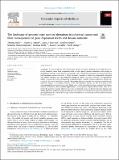The landscape of genomic copy number alterations in colorectal cancer and their consequences on gene expression levels and disease outcome
Abstract
Aneuploidy, the unbalanced state of the chromosome content, represents a hallmark of most solid tumors, including colorectal cancer. Such aneuploidies result in tumor specific genomic imbalances, which emerge in premalignant precursor lesions. Moreover, increasing levels of chromosomal instability have been observed in adenocarcinomas and are maintained in distant metastases. A number of studies have systematically integrated copy number alterations with gene expression changes in primary carcinomas, cell lines, and experimental models of aneuploidy. In fact, chromosomal aneuploidies target a number of genes conferring a selective advantage for the metabolism of the cancer cell. Copy number alterations not only have a positive correlation with expression changes of the majority of genes on the altered genomic segment, but also have effects on the transcriptional levels of genes genome-wide. Finally, copy number alterations have been associated with disease outcome; nevertheless, the translational applicability in clinical practice requires further studies. Here, we (i) review the spectrum of genetic alterations that lead to colorectal cancer, (ii) describe the most frequent copy number alterations at different stages of colorectal carcinogenesis, (iii) exemplify their positive correlation with gene expression levels, and (iv) discuss copy number alterations that are potentially involved in disease outcome of individual patients.
Citation
Ried , T , Meijer , G A , Harrison , D J , Grech , G , Franch-Expósito , S , Briffa , R , Carvalho , B & Camps , J 2019 , ' The landscape of genomic copy number alterations in colorectal cancer and their consequences on gene expression levels and disease outcome ' , Molecular Aspects of Medicine , vol. 69 , pp. 48-61 . https://doi.org/10.1016/j.mam.2019.07.007
Publication
Molecular Aspects of Medicine
Status
Peer reviewed
ISSN
0098-2997Type
Journal article
Description
This work has been supported by the Instituto de Salud Carlos III and co-funded by the European Regional Development Fund (ERDF) [CP13/00160, PI14/00783, PI17/01304 to JC]; the Agència de Gestió d'Ajuts Universitaris i de Recerca, Generalitat de Catalunya [2017 SGR 1035]; PERIS Generalitat de Catalunya [SLT002/16/00398 to JC]; Fundación Científica de la Asociación Española Contra el Cáncer [GCB13131592CAST]; the intramural program of the National Institutes of Health. CIBEREHD is funded by the Instituto de Salud Carlos III. This article is based upon work from COST Action [CA17118], supported by COST (European Cooperation in Science and Technology). RB is supported by a REACH HIGH Scholars Programme-PostDoctoral Grants. The grant is part-financed by the EU, Operational Programme II-Cohesion Policy 2014–2020 investing in human capital to create more opportunities and promote the wellbeing of society-European Social Fund.Collections
Items in the St Andrews Research Repository are protected by copyright, with all rights reserved, unless otherwise indicated.

